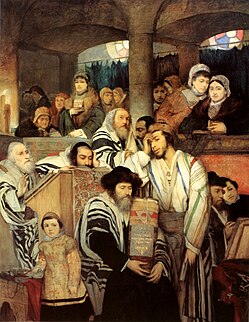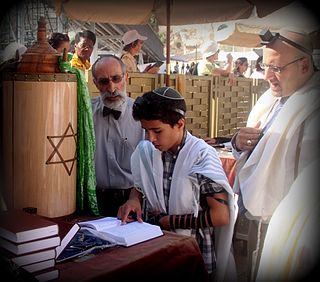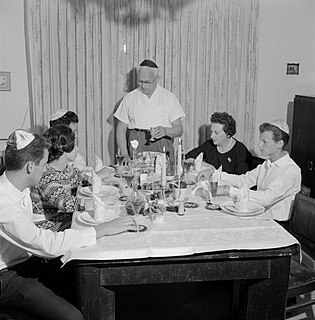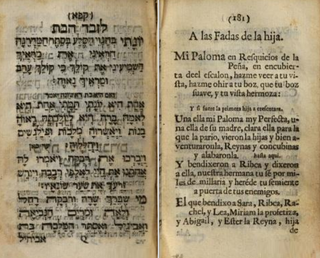Related Research Articles

Jewish holidays, also known as Jewish festivals or Yamim Tovim, are holidays observed in Judaism and by Jews throughout the Hebrew calendar. They include religious, cultural and national elements, derived from three sources: biblical mitzvot ("commandments"), rabbinic mandates, and the history of Judaism and the State of Israel.

Jewish prayer is the prayer recitation that forms part of the observance of Rabbinic Judaism. These prayers, often with instructions and commentary, are found in the Siddur, the traditional Jewish prayer book.

The role of women in Judaism is determined by the Hebrew Bible, the Oral Law, by custom, and by cultural factors. Although the Hebrew Bible and rabbinic literature mention various female role models, religious law treats women differently in various circumstances.

Shabbat or the Sabbath, also called Shabbos by Ashkenazim, is Judaism's day of rest on the seventh day of the week—i.e., Saturday. On this day, religious Jews remember the biblical stories describing the creation of the heaven and earth in six days and the redemption from slavery and The Exodus from Egypt, and look forward to a future Messianic Age. Since the Jewish religious calendar counts days from sunset to sunset, Shabbat begins in the evening of what on the civil calendar is Friday.

Yom Kippur is the holiest day of the year in Judaism. Its central themes are atonement and repentance. Jews traditionally observe this holy day with a day-long fast, confession, and intensive prayer, often spending most of the day in synagogue services. The High Holy Days comprise both Rosh HaShanah and Yom Kippur.

The Passover Seder is a ritual feast at the beginning of the Jewish holiday of Passover. It is conducted throughout the world on the eve of the 15th day of Nisan in the Hebrew calendar. The day falls in late March or in April of the Gregorian calendar; Passover lasts for seven days in Israel and eight days outside Israel. Jews traditionally observe one seder if in Israel and two if in the Jewish diaspora. The Seder is a ritual involving a retelling of the story of the liberation of the Israelites from slavery in ancient Egypt, taken from the Book of Exodus (Shemot) in the Jewish Torah. The Seder itself is based on the Biblical verse commanding Jews to retell the story of the Exodus from Egypt: "You shall tell your child on that day, saying, 'It is because of what the LORD did for me when I came out of Egypt.'" At the seder, Jews read the text of the Haggadah, an ancient Tannaitic work. The Haggadah contains the narrative of the Israelite exodus from Egypt, special blessings and rituals, Talmudic commentaries, and Passover songs.

Bar mitzvah and bat mitzvah refer to the Jewish coming of age ritual. The plural is b'nei mitzvah for both boys and mixed gender groups, or b'not mitzvah for girls. The vast majority of celebrations occur at the age of 13 (boys) and 12 (girls).

Shavuot, or Shavuos in some Ashkenazi usage, commonly known in English as the Feast of Weeks, is a Jewish holiday that occurs on the sixth day of the Hebrew month of Sivan. In the Bible, Shavuot marked the wheat harvest in the Land of Israel. In addition, Orthodox rabbinic traditions teach that the date also marks the revelation of the Torah to Moses and the Israelites at Mount Sinai, which, according to the tradition of Orthodox Judaism, occurred at this date in 1314 BCE.

Tisha B'Av is an annual fast day in Judaism, on which a number of disasters in Jewish history occurred, primarily the destruction of both Solomon's Temple by the Neo-Babylonian Empire and the Second Temple by the Roman Empire in Jerusalem.

Simchat Torah or Simhat Torah is a Jewish holiday that celebrates and marks the conclusion of the annual cycle of public Torah readings, and the beginning of a new cycle. Simchat Torah is a component of the Biblical Jewish holiday of Shemini Atzeret, which follows immediately after the festival of Sukkot in the month of Tishrei.
Tzniut describes both the character trait of modesty and discretion, as well as a group of Jewish laws pertaining to conduct. The concept is most important within Orthodox Judaism.

Kiddush, literally, "sanctification", is a blessing recited over wine or grape juice to sanctify the Shabbat and Jewish holidays. Additionally, the word refers to a small repast held on Shabbat or festival mornings after the prayer services and before the meal.

Kosher wine is wine that is produced in accordance with halakha, and more specifically kashrut, such that Jews will be permitted to pronounce blessings over and drink it. This is an important issue, since wine is used in several Jewish ceremonies, especially those of Kiddush.

Zeved habat or Simchat Bat is the Jewish naming ceremony for newborn girls. The details of the celebration varies somewhat by Jewish community and will typically feature the recitation of specific biblical verses and a prayer to announce the name of the newborn child.
A seudat mitzvah, in Judaism, is an obligatory festive meal, usually referring to the celebratory meal following the fulfillment of a mitzvah (commandment), such as a bar mitzvah, bat mitzvah, a wedding, a brit milah, or a siyum. Seudot fixed in the calendar are also considered seudot mitzvah, but many have their own, more commonly used names.
Partnership minyan is a religious Jewish prayer group that seeks to maximize women's participation in services within the confines of Jewish law as understood by Orthodox Judaism. This includes enabling women to lead parts of service, read from the Torah, serve in lay leadership positions, sit in a more gender-balanced format, and in some cases count as part of a minyan ("quorum") of ten men and ten women. Partnership minyanim began in 2002 simultaneously in New York and Jerusalem, and have now spread to over 30 communities in at least five different countries around the world.
This article describes the principal types of religious Jewish music from the days of the Temple to modern times.
Congregation Shomrei Emunah is an Orthodox Jewish synagogue in the Greenspring neighborhood of Baltimore, Maryland. Rabbi Binyamin Marwick is the synagogue's rabbi.

The DC Minyan is a lay-led Jewish congregation in the Dupont Circle area of Washington, D.C., with programs including Shabbat/Sabbath and Holy Day worship services, education, social events, retreats, and opportunities for tikkun olam, improving and transforming the world. The majority of its worship services, educational programs, and special events take place at the Washington, D.C. Jewish Community Center (DCJCC).

Beth Shalom Reform Synagogue is a synagogue in the City of Cambridge. Founded in 1981, it held services in hired premises until 2015 when the community opened a new synagogue on a site on Auckland Road, the first Reform synagogue in Cambridge. The new building includes a prayer hall for at least 200 people. The building was dedicated on 6 September 2015 at a service led by Fiona Karet Frankl and addressed by Rabbi Laura Janner-Klausner, senior rabbi to the Movement for Reform Judaism.
References
- ↑ "Cheers And Fears: The Debate Over Kiddush Clubs". jewishweek.timesofisrael.com. Retrieved 2019-09-29.
- ↑ Csillag, Ron (2017-09-07). "Are (the) Kiddush clubs alright, or do they promote drinking?". The Canadian Jewish News. Retrieved 2019-09-29.
- ↑ "Kiddush Club - Chabad CHAi - South Tampa". www.chabadchaicenter.com. Retrieved 2019-09-29.
- ↑ "Kiddush Club". FED. Retrieved 2019-09-29.
- 1 2 Hoffman, Yair (2018-10-11). "Walking Out for the Rabbi's Drasha - To Participate In A KIDDUSH CLUB - A Halachic Analysis". Yeshiva World News. Retrieved 2019-09-29.
- ↑ Csillag, Ron (2017-09-07). "Are (the) Kiddush clubs alright, or do they promote drinking?". The Canadian Jewish News. Retrieved 2019-09-29.